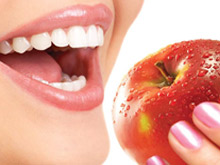Health Topics
-
Healthy Living
-
|
|
February 2010
|
| Pearly Set for a Healthy Heart |
| Dr Prakas Chandra Mandal |
| |
 |
'Heart in the mouth' is a popular expression used to explain extreme nervousness, shock or fear. The relation between the heart and mouth is a bit deeper though. To ensure good heart health, a healthy mouth or more specifically, a healthy set of teeth is imperative |
Researchers have long postulated a direct correlation between gumdisease causing bacteria and increased coronary artery disease risk. A recent research by Dr Moise Desvarieux and co-workers of Columbia University Medical Center's Mailman School of Public Health, studied 657 people without any cardiac history. Their levels of gum-disease causing bacteria and the thickness of their carotid artery walls (a recognised measure of heart attack risk) were measured. The vessel walls in heavy bacteria growers were predictably thicker, and by corollary, more prone to sickness, without any exception!
Streptococcus Mutans, the teeth decaying bacteria, easily pass into the blood circulation stream and initiate an inflammatory reaction, which is the normal defence mechanism of the body. In the process, the walls get thicker, narrowing the diameter of the blood vessel and increasing the risk of coronary artery disease. Patients with known Coronary Artery Disease (CAD), those with implanted stents and those with bypass grafting need to be even more careful to prevent further deterioration of their coronary status.
Rheumatic Heart Disease
Rheumatic heart disease is a common occurrence in our country. Initially showing up as fever and flickering joint pain and sore throat, rheumatic fever usually is recurrent and chronic in nature. After a while, the fever and joint pain subside in most cases, but the bacteria find a cosy place in the heart, affecting the delicate valves. The valves either get narrowed (stenosis) obstructing the blood flow, or the cusps of the valves get destroyed and leak blood, leading to backflow of blood (regurgitation).
This condition is mainly seen in young adults, more in teenage girls. These weakened valves have a greater tendency for being infected. Gum infections have perhaps the greatest propensity to migrate to the heart and cause more damage.
Rheumatic fever and heart disease is highly preventable with longterm prevention plan of penicillin, maintenance of personal and community hygiene and regular checkups with a cardiologist. Those whose heart disease treatment had involved placement of patch, conduits, prosthetic valves and other foreign materials etc, also need to be careful about their dental health.
6 Ways to Take Care
Sometimes dental procedures carried without proper sterilisation, particularly in those with pre-exiting heart condition or weak immune system, may result in a dangerous infection called infective endocarditis. The innermost lining of the heart gets infected and damaged in this process. It is thus very important for heart patients undergoing any dental procedure to inform their condition to the dentist. In most cases, prophylactic antibiotics will be prescribed to minimise the risk of any infection. It is important to continue the antibiotics as per instruction and not stop in between to increase the risk of resistance.
- If you have a heart condition, be selective about your dental care. Opt for places which has adequate infrastructure for proper sterilisation and expertise to deal with cardiac patients.
- Brushing twice a day must become a regimen. The brushing technique is also important.
- Indulge in food that allows sufficient exercise for your teeth. That includes fruits and raw vegetables like carrot, beet, turnip etc.
- Limit your intake of high-carb food like chocolates, sweet and condiments. They promote the growth of harmful bacteria and accelerate the process of developing cavities. Whenever you take such food, try to brush your teeth or at least wash your mouth thoroughly.
- If cavities have already developed, take early steps to halt its progression. A number of advanced treatments are now available where the affected tooth can be treated and preserved.
- Visit your dentist at least once a year, for preventive dental care. Flossing, removal of plaques and similar small-scale procedures go a long way to keep you smiling.
|
|
 |
Dr Prakas Chandra Mandal is Consultant Interventional Cardiologist at Apollo Gleneagles Hospitals, Kolkata |
|
|